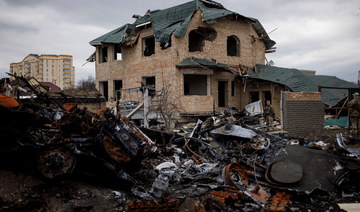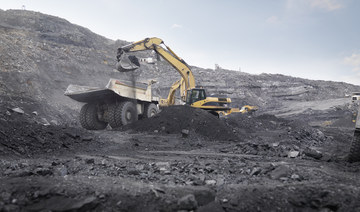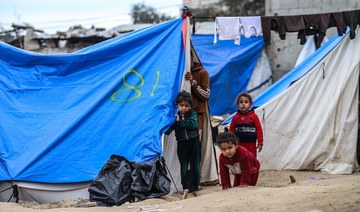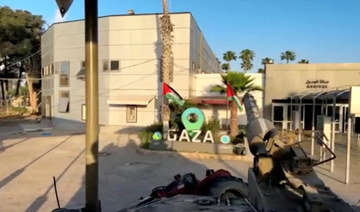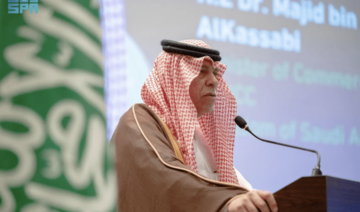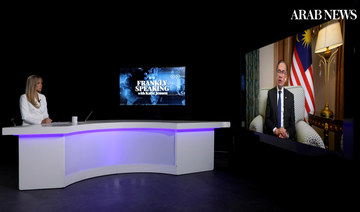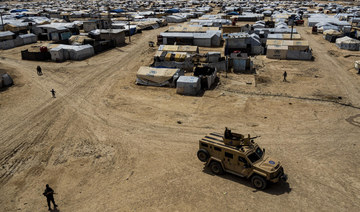KYIV: Ukraine was bracing to battle for control of its industrial east and appealing for more help from the West after Russian forces withdrew from the shattered outskirts of Kyiv to regroup.
Authorities were urging people to immediately evacuate from the Donbas region before Russia intensifies its offensive. In Brussels, Ukrainian Foreign Minister Dmytro Kuleba urged NATO to provide more weapons for his war-torn country to help prevent further atrocities like those reported in the city of Bucha.
“My agenda is very simple… it’s weapons, weapons and weapons,” Kuleba said as he arrived at NATO headquarters Thursday for talks with the military organization’s foreign ministers about Ukraine’s fight against Russia’s invasion.
“We know how to fight. We know how to win. But without sustainable and sufficient supplies requested by Ukraine, these wins will be accompanied by enormous sacrifices,” Kuleba said. “The more weapons we get and the sooner they arrive in Ukraine, the more human lives will be saved.”
NATO Secretary-General Jens Stoltenberg urged members to provide more weapons and not just defensive arms. Some NATO members worry that they may be Russia’s next target but the alliance is striving to avoid moves that might pull countries directly into the conflict.
“NATO is not sending troops to be on the ground. We also have a responsibility to prevent this conflict from escalating beyond Ukraine, and become even more deadly, even more dangerous and destructive,” Stoltenberg said.
A US defense official speaking on condition of anonymity said Russia had pulled all of its estimated 24,000 or more troops from the Kyiv and Chernihiv areas in the north, sending them into Belarus or Russia to resupply and reorganize, probably to return to fight in the east.
Growing numbers of Putin’s troops, along with mercenaries, have been reported moving into the Donbas. “Later, people will come under fire,” Ukrainian Deputy Prime Minister Iryna Vereshchuk said in urging civilians to evacuate from the mostly Russian-speaking industrial region, “and we won’t be able to do anything to help them.”
Ukrainian forces have been fighting Russia-backed separatists in the Donbas since 2014. Ahead of its Feb. 24 invasion, Moscow recognized the Luhansk and Donetsk regions as independent states.
Another Western official, also speaking on condition of anonymity to discuss intelligence estimates, said it may take Russia’s battle-damaged forces as much as a month to regroup for a major push on eastern Ukraine.
In his nightly address Wednesday, Ukrainian President Volodymyr Zelensky also warned Russia’s military is gearing up for a new offensive in the east.
Ukraine, too, was preparing for battle, he said.
“We will fight and we will not retreat,” he said. “We will seek all possible options to defend ourselves until Russia begins to seriously seek peace. This is our land. This is our future. And we won’t give them up.”
In areas north of the capital, Ukrainian officials were gathering evidence of Russian atrocities amid signs Moscow’s troops killed people indiscriminately before retreating.
Ukrainian authorities said the bodies of least 410 civilians were found in towns around Kyiv, victims of what Zelensky has portrayed as a Russian campaign of murder, rape, dismemberment and torture. Some victims had apparently been shot at close range. Some were found with their hands bound.
Zelensky accused Russia of interfering with an international investigation into possible war crimes by removing corpses and trying to hide other evidence in Bucha, northwest of Kyiv.
“We have information that the Russian troops have changed tactics and are trying to remove the dead people, the dead Ukrainians, from the streets and cellars of territory they occupied,” he said during his latest video address. “This is only an attempt to hide the evidence and nothing more.”
Switching from Ukrainian to Russian, Zelensky urged ordinary Russians “to somehow confront the Russian repressive machine” instead of being “equated with the Nazis for the rest of your life.”
He called on Russians to demand an end to the war, “if you have even a little shame about what the Russian military is doing in Ukraine.”
In reaction to the alleged atrocities outside Kyiv, the US announced sanctions against Putin’s two adult daughters and said it is toughening penalties against Russian banks. Britain banned investment in Russia and pledged to end its dependence on Russian coal and oil by the end of the year.
The US Senate planned to take up legislation Thursday to end normal trade relations with Russia, paving the way for higher tariffs on some imports, and to codify President Joe Biden’s executive action banning imports of Russian oil.
The European Union is also expected to take additional punitive measures, including an embargo on coal.
The Kremlin has insisted its troops have committed no war crimes and alleged the images out of Bucha were staged by the Ukrainians.
Bodies were still being collected in the city. On Wednesday, The Associated Press saw two in a house in a silent neighborhood. From time to time there was the muffled boom of workers clearing the town of mines and other unexploded ordnance.
Workers at a cemetery began to load more than 60 bodies into a grocery shipping truck for transport to a facility for further investigation.
Police said they found at least 20 bodies in the Makariv area west of Kyiv. In the village of Andriivka, residents said the Russians arrived in early March, taking locals’ phones and detaining and then releasing some people. Others met unknown fates. Some described sheltering for weeks in cellars normally used for storing vegetables.
“First we were scared, now we are hysterical,” said Valentyna Klymenko, 64. She said she, her husband and two neighbors weathered the siege by sleeping on stacks of potatoes covered with a mattress and blankets. “We didn’t cry at first. Now we are crying.”
In the southern port city of Mariupol, Mayor Vadym Boichenko said that of the more than 5,000 civilians killed during weeks of Russian bombardment and street fighting, 210 were children. Russian forces bombed hospitals, including one where 50 people burned to death, he said.
Boichenko said more than 90 percent of the city’s infrastructure was destroyed. The attacks on the strategic city on the Sea of Azov have cut off food, water, fuel and medicine and pulverized homes and businesses.
British defense officials said 160,000 people remained trapped in the city, which had a prewar population of 430,000. A humanitarian relief convoy accompanied by the Red Cross has been trying for days without success to get into the city.
Capturing Mariupol would allow Russia to secure a continuous land corridor to the Crimean Peninsula, which Moscow seized from Ukraine in 2014.
Ukraine seeks arms from NATO as fight looms on eastern front
https://arab.news/jjsvs
Ukraine seeks arms from NATO as fight looms on eastern front
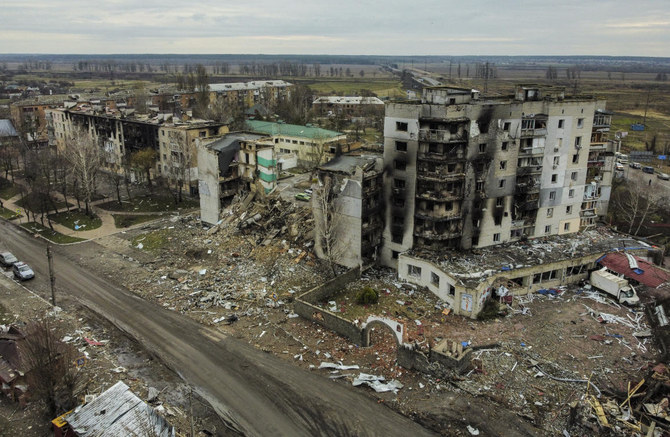
- NATO Secretary-General Jens Stoltenberg urged members to provide more weapons and not just defensive arms
Berlin students protest for Gaza as demos spread across Europe
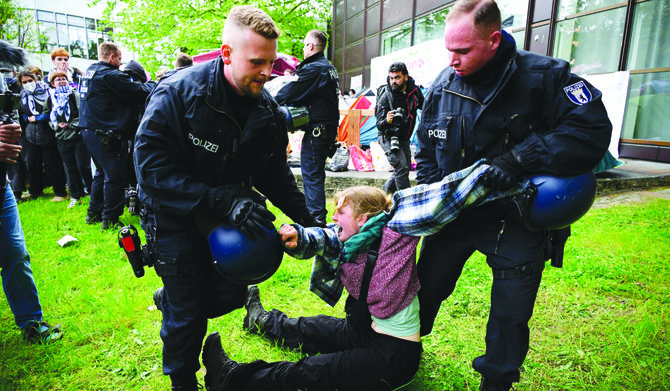
- Scuffles erupt between officers, protesters
- Crackdown on University of Amsterdam protest
- Israel has killed more than 34,700 Palestinians, most of them women and children, according to the Hamas government's Ministry of Health
AMSTERDAM: German police on Tuesday broke up a protest by several hundred pro-Palestinian activists who had occupied a courtyard at Berlin’s Free University earlier in the day, the latest such action by authorities as protests that have roiled campuses in the US spread across Europe.
Some demonstrators have even called for a break in academic ties with Israel over the war in Gaza.
In Berlin, the protesters had put up about 20 tents and formed a human chain around them. Most had covered their faces with medical masks and draped keffiyeh scarves around their heads, shouting slogans such as “Viva, viva Palestina.”
Berlin police called on the students via loudspeakers to leave the campus. Police were seen carrying some students away as scuffles erupted between officers and protesters. Police also used pepper spray against some of the protesters.
In the eastern German city of Leipzig, about 50 pro-Palestinian protesters set up tents on campus of Leipzig University and occupied a lecture hall on Tuesday afternoon.
Earlier on Tuesday, Dutch police broke up a similar pro-Palestinian demonstration camp at the University of Amsterdam. Police spokeswoman Sara Tillart said about 140 protesters were arrested, two of whom remain in custody on suspicion of committing public violence.
Amsterdam police said on the social media platform X that their action was “necessary to restore order” after protests turned violent. There were no immediate reports of injuries.
Video aired by national broadcaster NOS shows police using a mechanical digger to push down barricades and officers with batons and shields moving in, beating some of the protesters and pulling down tents. Protesters had formed barricades from wooden pallets and bicycles, NOS reported.
In Austria, protesters camped out in about 20 tents set up in the main courtyard of the University of Vienna for a second day Tuesday. With police monitoring, protesters cordoned off the encampment, which is near a memorial for Austrian Jews who perished in the Holocaust.
The University of Vienna and the main Austrian Union of Students distanced themselves from the protest. The union said “antisemitic groups were among the protest’s organizers,” which the protesters denied. Pro-Palestine protest camps have sprung up at about a dozen universities in Britain, including at Oxford and Cambridge, urging the institutions to fully disclose investments, cut academic ties with Israel and divest from businesses linked to the country.
Dozens of students have pitched up Gaza solidarity encampments on lawns outside King’s College at Cambridge University and the Pitt Rivers Museum in Oxford.
“Oxbridge’s profits cannot continue to climb at the expense of Palestinian lives, and their reputations must no longer be built on the whitewashing of Israeli crimes,” said a joint statement from protesters at the two universities.
Over 200 Oxford academics have signed an open letter supporting the protests.
In Finland, dozens of protesters from the Students for Palestine solidarity group set up an encampment outside the main building at the University of Helsinki, saying they would stay there until the university, which is Finland’s largest academic institution, cuts academic ties with Israeli universities.
In Denmark, students set up a pro-Palestinian encampment at the University of Copenhagen, erecting about 45 tents outside the campus of the Faculty of Social Sciences. The university said students can protest but called on them to respect the rules on campus grounds.
In Italy, students at the University of Bologna, one of the world’s oldest universities, set up a tent encampment over the weekend to demand an end to the war in Gaza as Israel prepared an offensive in Rafah, despite pleas from its Western allies against it. Groups of students organized similar protests in Rome and Naples, which were largely peaceful.
In Spain, dozens of students have spent over a week at a pro-Palestinian encampment on the University of Valencia campus. Similar camps were set up Monday at the University of Barcelona and at the University of the Basque Country. A group representing students at Madrid’s public universities announced it would step up protests against the war in the coming days.
In Paris, student groups called for gatherings in solidarity with Palestinians later Tuesday.
On Friday, French police peacefully removed dozens of students from a building at the Paris Institute of Political Studies, known as Sciences Po, after they had gathered in support of Palestinians.
On Tuesday, students at the prestigious institution, which counts French Premier Gabriel Attal and President Emmanuel Macron among its alumni, were seen entering the campus unobstructed to take exams as police stood.
Key debt ratio resumes rise as global debt burden hits record $315 trillion, IIF says
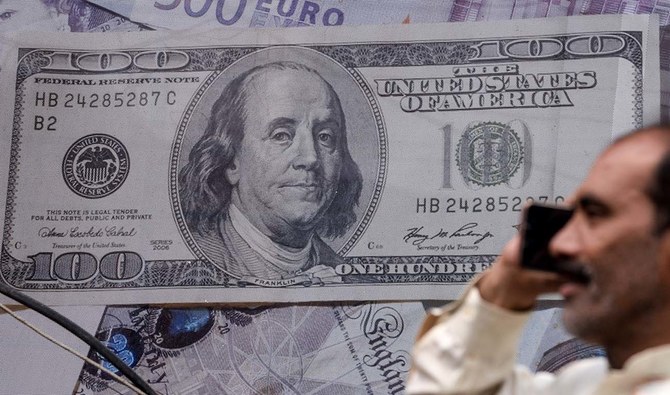
- The turnaround comes as dollar value of global debt surged by some $1.3 trillion quarter-on-quarter
- Pakistan is set to spend above 50 percent of its revenue on interest and Egypt more than 60 percent
NEW YORK: A key measure of world indebtedness has resumed its climb as global debt hit a record high of $315 trillion in the first quarter of the year, fueled by borrowing in emerging markets, the United States and Japan, a study showed.
The global debt-to-output ratio — a measure describing the ability of a borrower to pay back debt — rose to hit 333 percent after three consecutive quarters of decline, the Institute of International Finance (IIF) said on Tuesday in its quarterly Global Debt Monitor report.
The turnaround comes as the dollar value of global debt surged by some $1.3 trillion quarter-on-quarter.
Debt in emerging markets grew to a record of more than $105 trillion — having more than doubled over the past decade according to IIF data.
The largest contributors to the increase among emerging economies were China, India and Mexico. South Korea, Thailand, and Brazil posted the largest dollar value declines in overall debt among the subgroup, the data showed.
“Government budget deficits are still higher than pre- pandemic levels and are projected to contribute around $5.3 trillion to global debt accumulation this year,” the IIF said in a statement. “Rising trade friction and geopolitical tensions also present significant potential headwinds for debt markets.”
Interest rates were expected to have started declining in the United States by now but sticky inflation has seen the Federal Reserve stand its ground.
This has meant higher borrowing costs across the globe and, for many emerging markets, weakened currencies that further exacerbate the cost of servicing debt and “could once again bring government debt strains to the fore,” the IIF said.
Egypt and Pakistan are seen as the emerging economies where the interest expense on government debt will be highest through 2026, with Pakistan set to spend above 50 percent of revenue on interest and Egypt more than 60 percent.
Among developed economies, the United States and Japan saw debt rise the quickest, adding 17 percentage points and 4 percentage points respectively.
Japan is expected to continue to spend on average under 2 percent of government revenue in debt servicing through 2026, according to the IIF. In the US, the figure is expected to rise above 10 percent from the current 8 percent and brush against 12 percent in the same period.
Last month, the International Monetary Fund warned the US level of spending is “of particular concern” and “out of line with long-term fiscal sustainability.”
UK prime minister summons university leaders over pro-Palestinian protests
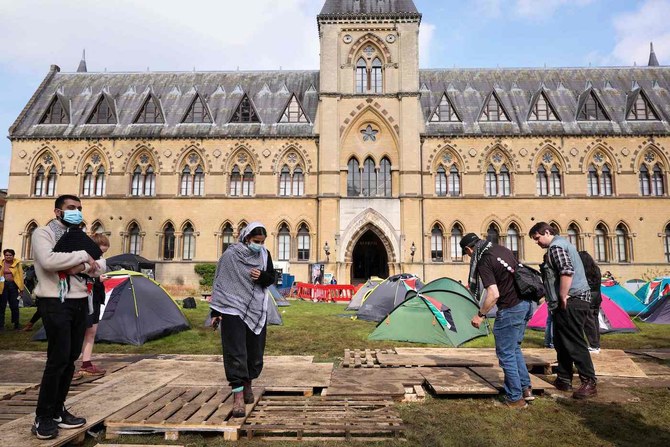
- Meeting to discuss antisemitism, ensuring Jewish students are safe
LONDON: UK Prime Minister Rishi Sunak is to summon the leaders of universities following pro-Palestinian protests that have taken place at campuses across the country.
The meeting will take place this week to discuss antisemitism on campuses and ensuring Jewish students are safe, Sunak told Britain’s Cabinet on Tuesday.
A spokesman for the prime minister said Sunak expected university leaders to take “robust action” in dealing with the protests, The Evening Standard reported.
“Our university campuses should be places of rigorous debate, but they should also be tolerant places where people of all communities, particularly Jewish students at this time, are treated with respect,” the spokesman said.
The “right to free speech does not include the right to harass people or incite violence,” he added.
The summons comes after British students set up pro-Palestinian protest encampments at Oxford and Cambridge campuses on Monday, in a show of solidarity with their American peers.
Cambridge University said its priority was the “safety of all staff and students” and that it was committed to freedom of speech.
“We will not tolerate antisemitism, Islamophobia and any other form of racial or religious hatred, or other unlawful activity,” a spokesperson said.
Pro-Palestinian protests have been taking place at US universities since April 17 and the protests have spread to Europe.
Police broke up student demonstrations in the Netherlands, Germany, and France on Tuesday as Israeli forces seized the main border crossing between Egypt and southern Gaza.
2,000 religious leaders attend Muslim World League conference in Kuala Lumpur
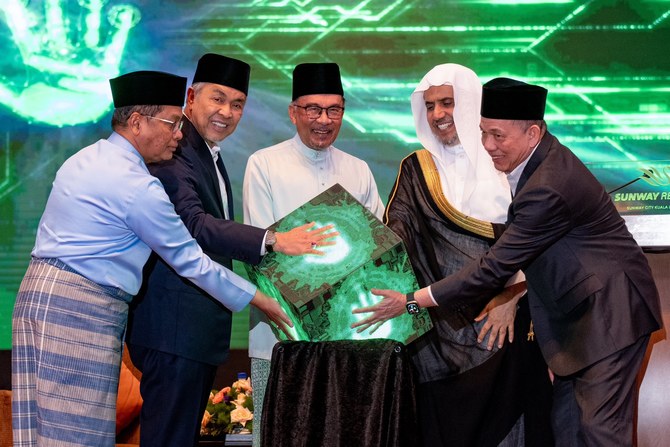
- MWL co-organized international gathering with the Malaysian government
- Prime Minister Anwar Ibrahim delivers speech during the conference
KUALA LUMPUR: More than 2,000 religious leaders and scholars from 57 countries gathered in Kuala Lumpur on Tuesday for a conference organized by the Muslim World League to discuss the role of religion in facilitating dialogue and peace initiatives.
The MWL, an international non-governmental Islamic organization founded in Saudi Arabia in 1962, organized the 2024 International Conference of Religious Leaders with Malaysia’s Department of Islamic Development.
The conference was inaugurated by Malaysian Prime Minister Anwar Ibrahim and MWL Secretary-General Sheikh Dr. Mohammad bin Abdulkarim Al-Issa.
“This religious conference will be an annual feature in Malaysia since it has proved successful in building an understanding and affinity among religions in the world, as well as in Malaysia,” Anwar said during his speech.
“In a conference like this, we can observe the things that need to be done and need to be improved among Muslims, Christians, Buddhists or Hindus. We want to listen to your advice, criticisms and suggestions.”
While about two-thirds of Malaysia’s more than 33 million population are Muslims, there are also large Buddhist, Hindu, and Christian minorities in the country.
“Religious leaders should take an active, effective and courageous role in promoting peace and justice. It is the duty of religious leaders to ensure that governance is guided by strong moral and ethical values,” Anwar said.
Al-Issa said the conference seeks to have a tangible impact.
“This international conference was attended by international, religious, political, intellectual, academic and media leaders. It is considered the first nucleus of a major breakthrough through a number of initiatives and programs around the world, aiming to enhance friendship and cooperation between nations and peoples,” he said.
“Our world is most in need of true solidarity, solidarity with a tangible impact, and is most in need of awareness of the threats threatening its global peace and the harmony of its diverse national communities in their religions and races.”
US repatriates two dozen Westerners from Syria Daesh camp
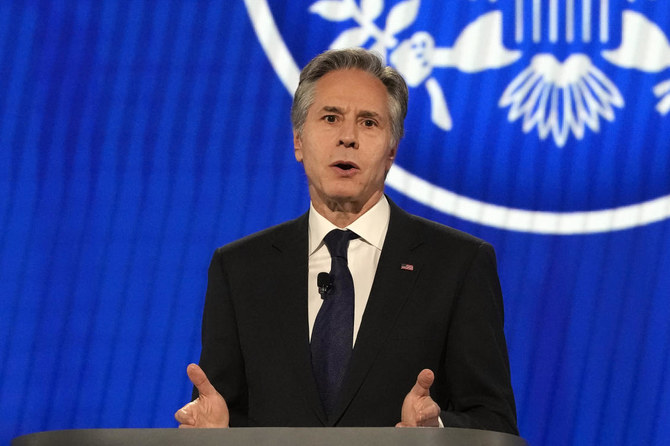
- In a complex operation involving US agencies, Kuwait and pro-US Kurdish fighters, the United States repatriated 11 US citizens
- The US also facilitated the repatriation of six Canadian citizens, four Dutch citizens, and one Finnish citizen
WASHINGTON: The United States announced Tuesday it had brought back two dozen Western citizens, half of them Americans, from a camp for Daesh prisoners in Syria, its largest-ever repatriation as thousands languish.
In a complex operation involving US agencies, Kuwait and pro-US Kurdish fighters, the United States repatriated 11 US citizens, including five minors, as well as a nine-year-old non-US sibling of an American, Secretary of State Antony Blinken said.
The United States in the same operation facilitated the repatriation of six Canadian citizens, four Dutch citizens, and one Finnish citizen, among them eight children, he said.
“This is the largest single repatriation of US citizens from northeast Syria to date,” Blinken said in a statement.
“The only durable solution to the humanitarian and security crisis in the displaced persons camps and detention facilities in northeast Syria is for countries to repatriate, rehabilitate, reintegrate and, where appropriate, ensure accountability for wrongdoing,” he said.
The United States has long pushed European governments to bring back nationals who went to fight for the Daesh group — or their children.
Most European countries have done so but slowly and despite initial reservations, especially in countries with a history of jihadist attacks at home such as France and Britain.
Blinken did not identify the people who were repatriated.
The New York Times, quoting unidentified sources, said they included an American woman, whose Turkish husband apparently took the family to Daesh territory and was later killed, and their nine children.
The Star Tribune of Minneapolis reported last week that a man who joined Daesh but then became a valuable informant was seeking the repatriation of two sons, one apparently the non-US citizen, to be raised by their grandparents in Minnesota.
The repatriations remain controversial in the United States as well, with the administration of former president Donald Trump in one prominent case insisting that a young woman seeking to return was not legitimately a US citizen.
The Kurdish-led Syrian Democratic Forces (SDF) helped US forces crush the Daesh group.
Five years after the extremists were ousted from their last territory, the SDF still holds more than 56,000 detainees with alleged or perceived links to the Daesh group.
Kurdish authorities have been asking foreign governments to repatriate their nationals but Western governments have responded slowly for fear of domestic backlash.



